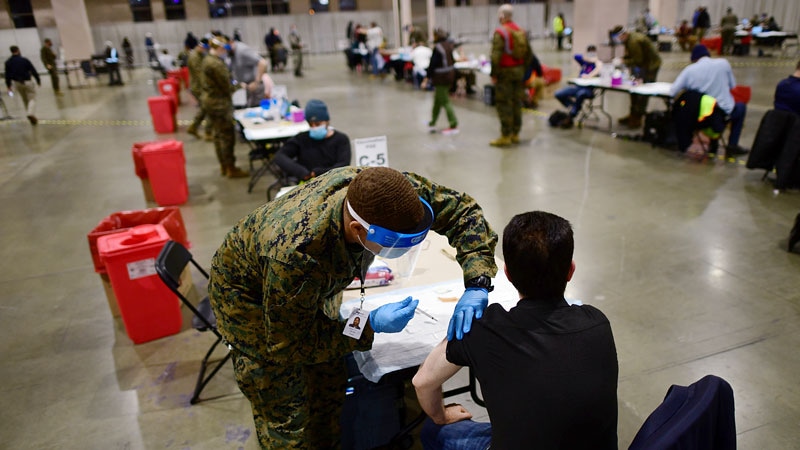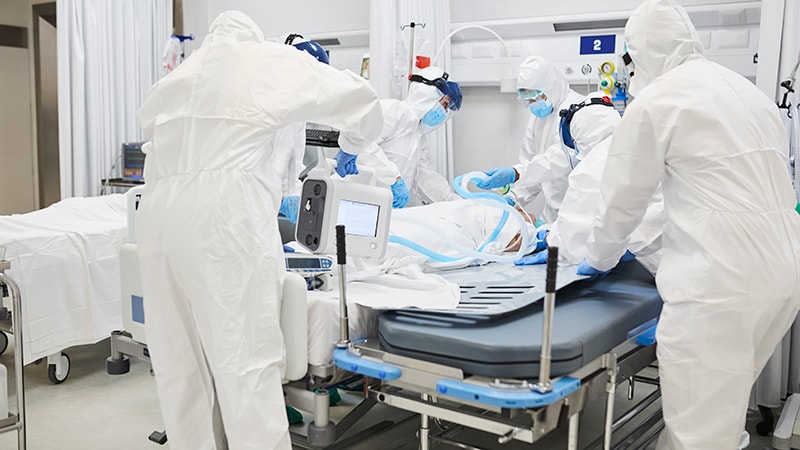- Joined
- Apr 3, 2004
- Messages
- 33,852
NZ has has 26 deaths from Covid. Twenty. Six. How many did your country have?
Have several seats.
You should hide under your bed till covid is gone...which means FOREVER!
NZ has has 26 deaths from Covid. Twenty. Six. How many did your country have?
Have several seats.



From one of my physician's regular emails to all her patients.
"
Over the past four weeks, the delta variant has made up 90% of tested Covid cases in NYC. Delta is twice as contagious as regular Covid, so this makes sense. The good news is that the vaccines are holding up well. The delta variant causes more severe disease, but only in unvaccinated people. Close to 100% of deaths and hospitalizations for Covid recently have been among the unvaccinated. A CDC report shows that, since July 26, there have been only 6,587 reports of breakthrough infections that resulted in hospitalization or death among 163 million fully vaccinated people — that’s significantly less than 0.01%.
Breakthrough infections in fully vaccinated people are on the rise, but folks are typically asymptomatic or only mildly symptomatic. I have had many patients with no symptoms at all who tested positive for Covid on random spot checks at work or before travel. I have also had many patients with a mild sore throat or the sniffles who tested positive for Covid. If you are having any symptoms, no matter how mild, please get checked for Covid just in case. No one in our current pandemic situation can determine in the absence of testing that they “only have a cold.”
I ask every patient who enters the office if they have been in contact with anyone with Covid symptoms in the past 2 weeks, or if they themselves have any symptoms. A surprising number of people have answered that they’ve had no symptoms or exposures, but during the course of the appointment they give a cough or sniffle. When I inquire about it they say, “Oh, it’s just a cold. My child had it last week and gave it to me.” I then have to close off all of the spaces that have been occupied by that patient until the air can be cleared and the space can be disinfected. I will not turn you away if you answer “yes” to Covid-exposure questions; we will just relocate to my courtyard or to my new exam room just off the courtyard. I will change into more protective PPE (personal protective equipment) and I will provide you with Covid testing in addition to addressing the reason for which you made the appointment. Please be upfront about any possible Covid symptoms or exposures!
I will repeat for emphasis: No one can determine whether a respiratory illness is an ordinary cold or a mild case of Covid or without PCR testing. I understand that it is hard to comprehend, but the same disease killing millions of people can also manifest as just a minor cold, especially among people who have been vaccinated. No matter how mild it may seem, every respiratory illness must be presumed Covid until proven otherwise with negative PCR testing. The same viral strain that gives one person the sniffles can kill another person if it is allowed to spread.
The CDC also recommends that everyone over age 2 who enters a medical facility should be wearing a properly fitted mask with a wired nose bridge that can conform around the nose. A properly fitted mask protects you and others much more effectively than a loose mask with open gaps. I will be happy to provide patients with 3-ply surgical masks that conform to these standards during their office visit.
Here is information from the CDC on how to properly fit a mask:
https://www.cdc.gov/coronavirus/2019-ncov/prevent-getting-sick/mask-fit-and-filtration.html
I have a new favorite mask that you might want to try: https://airqueen.com/
It feels like nothing. I can wear it all day with no issue at all. No discomfort. No mask acne. No glasses fog. It does not get sucked into the mouth with deep inhalation.
There are adult and pediatric models available.
I still wear an N95 or KN95 mask if I am entering a situation with someone who is not vaccinated or whose status I do not know—like the folks in a grocery store. Even if DeBlasio says otherwise, I still recommend that all people continue masking in public indoor spaces and consider masking in crowded public outdoor spaces, given how easily the delta variant spreads.
The “Key To NYC” mandate says that everyone entering restaurants, bars, gyms, and entertainment venues must show proof of at least one vaccine, but they do not have to prove that they are fully vaccinated. Proceed with caution in indoor spaces, especially indoor spaces, like restaurants, where others are unmasked.
Covid Vaccine Boosters
Starting on September 20, booster shots will be available for people who were previously vaccinated with Pfizer or Moderna. The booster shots should be given at least 8 months after the original vaccine course was completed. Booster shots for Pfizer and Moderna are available now for the immunocompromised.
This is the booster announcement recently issued by the CDC:
Currently, CDC is recommending that moderately to severely immunocompromised people receive an additional dose. This includes people who have:
Johnson & Johnson Vaccine
- Been receiving active cancer treatment for tumors or cancers of the blood
- Received an organ transplant and are taking medicine to suppress the immune system
- Received a stem cell transplant within the last 2 years or are taking medicine to suppress the immune system
- Moderate or severe primary immunodeficiency (such as DiGeorge syndrome, Wiskott-Aldrich syndrome)
- Advanced or untreated HIV infection
- Active treatment with high-dose corticosteroids or other drugs that may suppress your immune response
There are no recommendations yet on boosters for the Johnson & Johnson vaccine, but the data are being analyzed and it is expected that a booster of this vaccine will be recommended as well. There are currently no recommendations that those who received the Johnson & Johnson should get a booster of Pfizer or Moderna. Mixing vaccines is actively discouraged by the CDC and FDA, as there have been no safety studies.
Many patients are asking my opinion about booster shots and mixing vaccines because news articles inevitably end with, “Ask your doctor what is right for you as an individual.” I do not know what secret information these news outlets think doctors have access to that is different from what they are reporting. The only information out there is from the CDC and FDA, which both say don’t mix vaccines. But some people, including some researchers, have done it anyway.
Note that patients in NYC are not eligible to obtain Pfizer or Moderna vaccines if they previously received Johnson & Johnson. This rule can be skirted by joining a study or crossing state lines. Other states do not have access to NY vaccine data. If a patient decides to go ahead and obtain an added Pfizer or Moderna shot, covertly and off-label, then both doses are recommended—not just one booster shot.
Here is a Time magazine report on the state of the Johnson & Johnson vaccine, which includes a link to join a study for mixing vaccines:
https://time.com/6078081/mixing-covid-vaccine-doses/
Covid Vaccines for Children
No official announcements have been made on when vaccines will be available for children under the age of 12. The only information I have heard is that it might happen by late fall 2021, and definitely by 2022. The studies seem to be going well, with no major adverse effects or issues by all reports.
"
@MamaBee , It was announced yesterday that nursing homes who receive any Federal funding will be requiring all staff to be vaccinated. I’m hoping this applies to the nursing home your mom is at.
D Yes @Calliecake! I think it does! I told my mom that there may be a drove of people quitting. I’m hoping that they reconsider. Thanks for remembering about my mom.
I’m hoping there isn’t a mass exit @MamaBee . I would imagine before too long vaccines will be requirements for employment at many places, not just hospitals and nursing homes. It makes no sense that those treating sick people or working with the elderly should be able to do so while being unvaccinated.
I agree @Calliecake I asked my mom to ask anyone that comes into her room if they are vaccinated. She said an occupational therapist that worked closely with her is unvaccinated. One nurse said she was afraid to get the vaccine..My mom asked her if she was afraid to get Covid. She said yes…

Is there a way you can keep this occupational therapist away from your mom and request someone else treat her?
My dad‘s wife is a home healthcare nurse. She just got her first shot of the vaccine about a week ago and has been taking care of patients in their homes for months. It’s insane.





When are the vaccine side effects supposed to hit?
It's been 5 hours and I feel nothing! Just like my usual self!
Sorry about this @Dancing Fire I hope her case is very mild. Did she fly to Seattle? Perhaps she caught it on the plane. Hope she recovers quickly.
Fake Covid !. her test result came back from the lab was negative. Home test was +, lab test was -.
As some U.S. hospitals reach a breaking point in the face of the Delta variant, nursing is in crisis. |
Bedside nurses are depleted and traumatized, their ranks thinned by early retirements or career shifts. The shortages are complicating efforts to treat coronavirus patients, who often require exacting, round-the-clock attention, leading to longer emergency room waiting times and rushed or inadequate care. |
“We’re exhausted, both physically and emotionally,” an emergency room nurse in Mississippi said, choking back tears. One in five I.C.U.s have at least 95 percent of their beds full, according to an analysis by The Times. |
In other virus news, the F.D.A. could give full approval to Pfizer-BioNTech’s vaccine as early as Monday. Orlando residents were asked to cut back on water use for several weeks to preserve the city’s supply of liquid oxygen for treating patients. Here are the latest updates. |